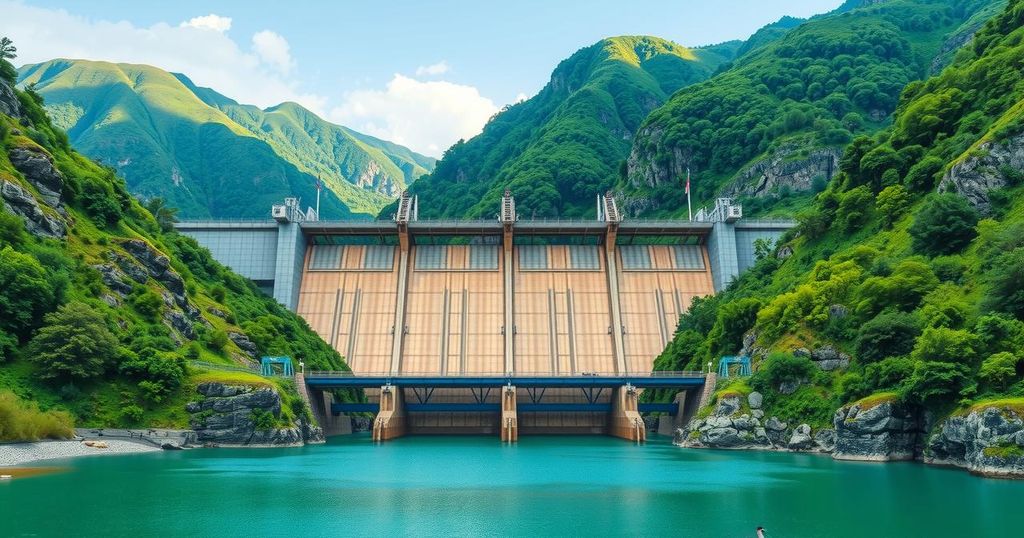Ecuador Set to Take Over Chinese-Built Coca Codo Sinclair Dam Amid Legal Dispute
Ecuador is preparing to take ownership of the Coca Codo Sinclair dam from Sinohydro despite ongoing international arbitration over construction defects. This move is crucial for enhancing energy resilience, particularly after last year’s energy crisis. The resolution of this dispute will influence future investments in Ecuador’s energy infrastructure and demonstrate the nation’s agency in managing foreign projects.
Ecuador is poised to take over the Coca Codo Sinclair hydroelectric dam, a significant Chinese-financed infrastructure initiative in Latin America, which has faced considerable scrutiny since its inauguration in 2016. Ecuadorian officials anticipate finalizing the handover of the project from Sinohydro Corporation within the next year. This transition emphasizes the active role of Southern countries like Ecuador in navigating the challenges posed by flawed Chinese projects aimed at boosting energy resilience.
Coca Codo Sinclair accounts for roughly 20-30 percent of Ecuador’s daily electricity consumption, operational despite not being formally transferred. However, a critical challenge to this transfer is an ongoing international arbitration at the International Court of Commerce (ICC) regarding defects in the powerhouse distributor pipes. These pipes contain micro-fissures, recognized as the most serious of several construction issues that are part of Ecuador’s claims against Sinohydro.
Despite ongoing repairs over the last decade, the fissures have proven persistent, while the sediment removal system has also failed to perform effectively, causing repeated operational halts. This has resulted in mounting public pressure on the Ecuadorian government to ensure that Sinohydro is held accountable before accepting the project.
According to Ecuador’s Ministry of Energy and Mines, the ICC may issue a decision regarding Sinohydro’s liability by the end of March, and any ruling will be binding. Following the arbitration, the project will be positioned for a full transfer to Ecuador’s state electricity company. Both nations are eager to conclude this prolonged dispute, especially in light of last year’s severe energy shortages exacerbated by drought, highlighting the urgency to develop new power initiatives.
Chinese financing could play a significant role in supporting Ecuador’s emerging energy projects, particularly those focused on green energy solutions. However, financing negotiations, such as with the Export-Import Bank of China, will depend on the resolution of issues surrounding Coca Codo Sinclair. Hence, Ecuador has a strong motivation to finalize matters with Sinohydro promptly, facilitating a shift towards renewed energy collaborations with China.
Sinohydro aims to resolve this project, having committed extensive resources and personnel, under a “turnkey” contract that anticipated a timely completion and handover. The complications inherent in Coca Codo Sinclair, including issues of corruption and environmental impacts, pose a substantial threat to the company’s international reputation.
Discussions around potentially concessioning Coca Codo for ongoing management continue, which could alleviate risks from erosion and sediment issues for the Ecuadorian government. The resolution of this protracted dispute will have lasting implications, not just for Ecuador’s energy infrastructure investments but also for the robustness of its electricity supply. Ultimately, the Coca Codo Sinclair case illustrates the importance of local agency in holding foreign entities accountable in the management of large-scale projects.
In summary, Ecuador’s impending takeover of the Coca Codo Sinclair dam symbolizes a pivotal moment in the dialogue surrounding foreign investment and accountability within energy infrastructure projects. The outcome of the arbitration case against Sinohydro will significantly influence both Ecuador’s future collaborations in energy generation and its capacity to safeguard against risks associated with flawed projects. As Ecuador asserts its agency in this process, it sets a precedent for host countries facing similar challenges with international partnerships.
Original Source: chinaglobalsouth.com




Post Comment